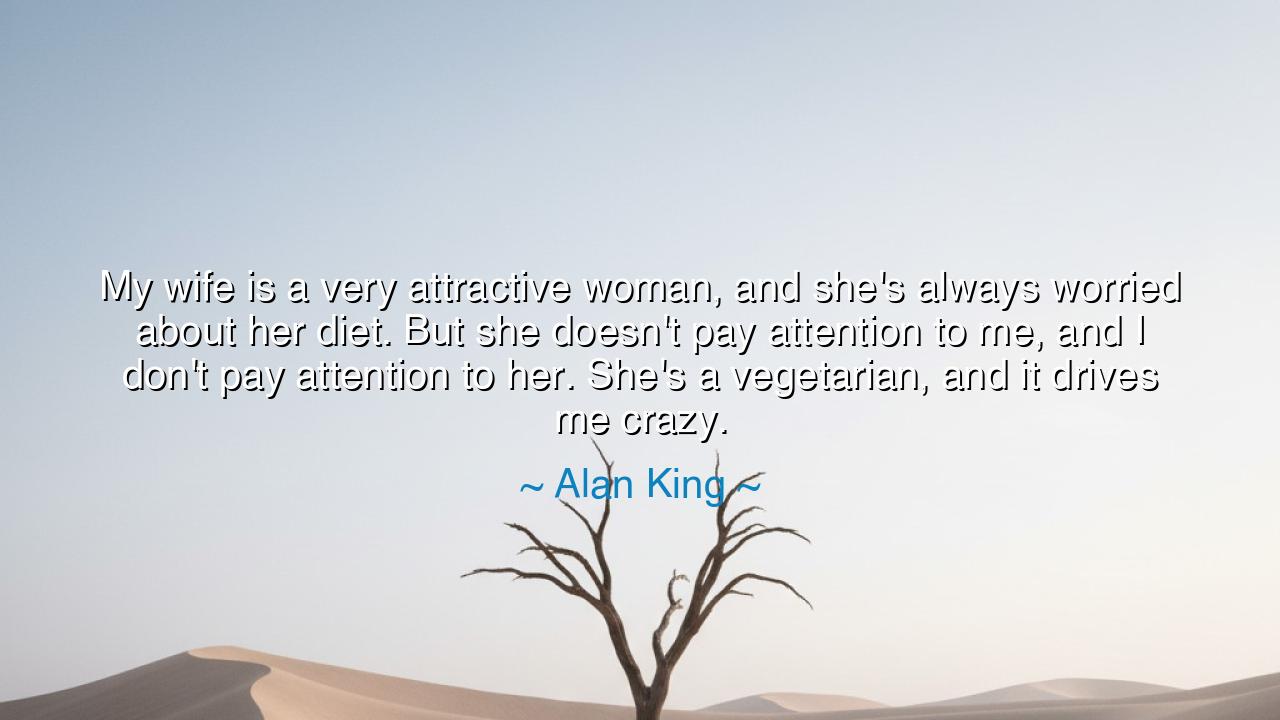
My wife is a very attractive woman, and she's always worried
My wife is a very attractive woman, and she's always worried about her diet. But she doesn't pay attention to me, and I don't pay attention to her. She's a vegetarian, and it drives me crazy.






When Alan King said, “My wife is a very attractive woman, and she's always worried about her diet. But she doesn't pay attention to me, and I don't pay attention to her. She's a vegetarian, and it drives me crazy,” he cloaked ancient truth in the garments of humor. Though he spoke as a comedian, his words contain the quiet lament of many relationships: that two people may share a home, yet live in separate worlds. Beneath the laughter lies a meditation on distance, difference, and devotion—the timeless struggle of love to survive amid individuality. His wit is the kind that masks wisdom, for jest has often been the tongue through which truth speaks most safely.
In his jest, the husband and wife become symbols of two eternal forces: union and independence. She, devoted to her diet and her ideals; he, bewildered by her choices and detached from her concerns. Each pursues their own way of life, and between them lies a quiet gulf—a space filled not with hatred, but with misunderstanding. This is not the tragedy of cruelty, but the tragedy of disconnection: when affection remains, but shared meaning fades. The ancients knew this well. In the myths of old, the gods themselves often quarreled not over love lost, but over pride and difference. Even Zeus and Hera, rulers of Olympus, could not escape this dance of attraction and distance.
The line “She doesn’t pay attention to me, and I don’t pay attention to her” speaks to a condition older than marriage itself—the withering that comes when routine replaces reverence. In every partnership, time tests tenderness. What was once novelty becomes habit; what was once passion becomes pattern. When one partner looks inward—to beauty, diet, discipline—and the other turns outward—to work, distraction, or complaint—they begin to orbit each other like planets bound by gravity but separated by space. King, with his sharp humor, turns this melancholy into laughter, for only laughter can lighten the weight of truth.
And yet, his frustration over her vegetarianism—that “it drives me crazy”—is not about food at all. It is about difference, and the discomfort of confronting what we do not share. Food, like belief, is sacred to the human spirit. To eat differently is to live differently, to mark one’s identity and values. The ancients understood this deeply. When Pythagoras adopted the vegetarian diet, he did so as an act of philosophy, believing that purity of body led to purity of soul. His followers were mocked and misunderstood, just as King, in his jest, feels alienated by his wife’s devotion. The comedy of this moment is born from the same truth that has always divided and united humankind: that love must learn to coexist with difference.
But the wisdom in King’s words lies not in despair—it lies in recognition. He sees what many fail to see: that attention, not affection, is the true currency of intimacy. To love someone is to see them, to participate in their world. The husband who does not look, the wife who does not listen—each, in time, becomes a stranger to the other. The ancients taught that relationships are like fires: they die not in the storm, but in neglect. One must feed the flame not only with passion, but with presence. King’s humor is a mirror, reflecting this neglected truth beneath the laughter.
Let us then look upon his jest as a parable. It is not merely about marriage, or diet, or domestic quarrels—it is about the fragility of connection. Every human bond requires both space and attention, both selfhood and surrender. The wise do not demand sameness from love, for sameness is dull; but neither do they allow difference to become distance. They learn, instead, the sacred art of curiosity: to ask, to listen, to participate even when they do not understand. For love that endures is not the union of likeness, but the reverence for difference.
And so, the lesson is clear: laugh at the small frustrations, but do not ignore their roots. If the one you love seems distant, do not retreat into silence; reach across the table, even if it is a table divided by meat and vegetables. See them, hear them, and let them see you. For love is not sustained by agreement, but by attention—and as Alan King reminds us through laughter, even in the chaos of difference, affection can still thrive when we choose to notice one another again.






AAdministratorAdministrator
Welcome, honored guests. Please leave a comment, we will respond soon